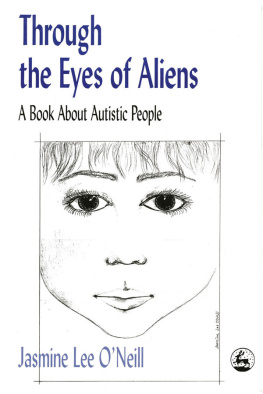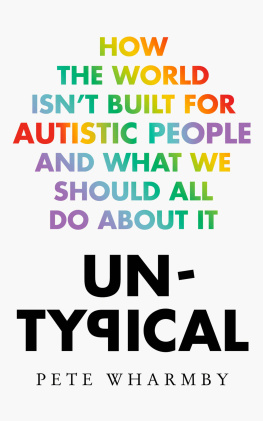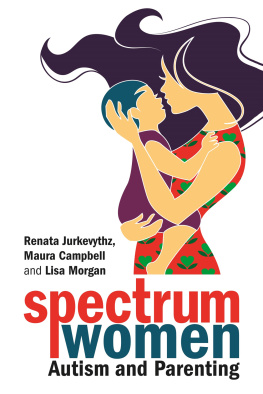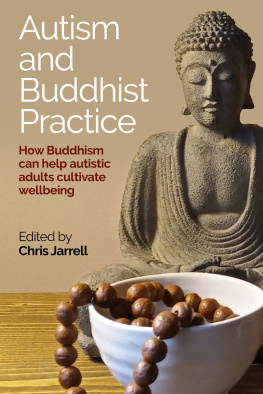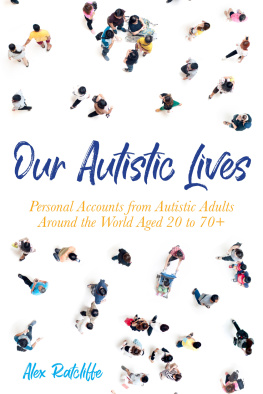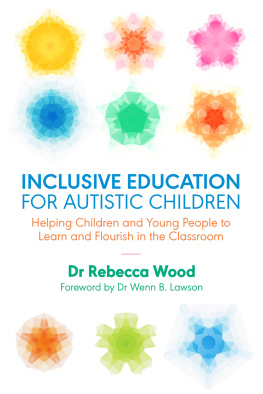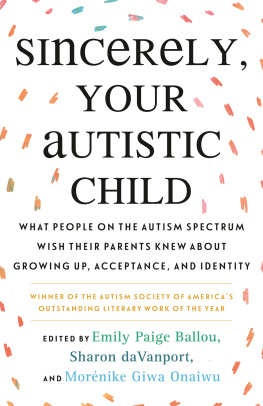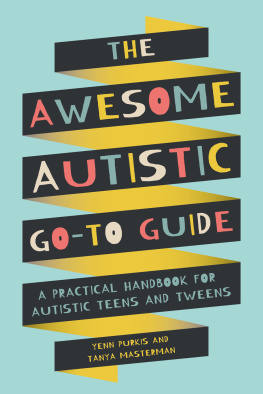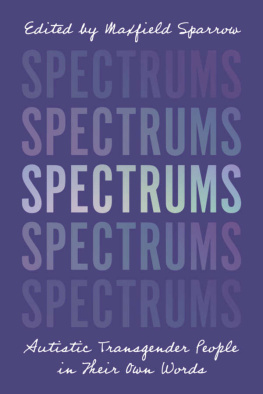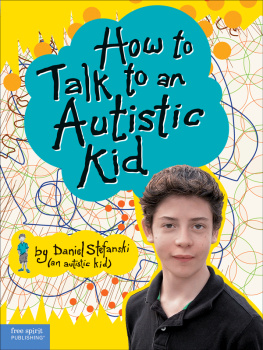of related interest
The Passionate Mind
How People with Autism Learn
Wendy Lawson
ISBN 978 1 84905 121 7
eISBN 978 0 85700 313 3
Autism and Me DVD
Rory Hoy
ISBN 978 1 84310 546 6
Siblings and Autism
Stories Spanning Generations and Cultures
Edited by Debra L. Cumberland and Bruce E. Mills
ISBN 978 1 84905 831 5
eISBN 978 0 85700 295 2
From Isolation to Intimacy
Making Friends without Words
Phoebe Caldwell with Jane Horwood
ISBN 978 1 84310 500 8
eISBN 978 1 84642 618 6
Using Intensive Interaction and Sensory Integration
A Handbook for Those who Support People with Severe Autistic Spectrum Disorder
Phoebe Caldwell with Jane Horwood
ISBN 978 1 84310 626 5
eISBN 978 1 84642 807 4
Using Intensive Interaction with a Person with a Social or Communicative Impairment
Graham Firth and Mark Barber
ISBN 978 1 84905 109 5
eISBN 978 0 85700 291 4
Promoting Social Interaction for Individuals with Communicative Impairments
Making Contact
Edited by M. Suzanne Zeedyk
ISBN 978 1 84310 539 8
eISBN 978 1 84642 783 1
Through the Eyes of Aliens
A Book about Autistic People
Jasmine Lee ONeill

Jessica Kingsley Publishers
London and Philadelphia
First published in the United Kingdom in 1999 by
Jessica Kingsley Publishers Ltd
73 Collier Street
London N1 9BE, UK
and
400 Market Street, Suite 400
Philadelphia, PA 19106, USA
www.jkp.com
Copyright 1999 Jasmine Lee ONeill
All rights reserved. No paragraph of this publication may be reproduced, copied or transmitted save with written permission of the Copyright Act 1956 (as amended), or under the terms of any licence permitting limited copying issued by the Copyright Licensing Agency, Saffron House, 610 Kirby Street, London EC1N 8TS. Any person who does any unauthorised act in relation to this publication may be liable to prosecution and civil claims for damages.
The right of Jasmine Lee ONeill to be identified as author of this work has been asserted by her in accordance with the Copyright, Designs and Patents Act 1988.
Library of Congress Cataloging in Publication Data
A CIP catalog record for this book is available from the Library of Congress
British Library Cataloguing in Publication Data
ONeill, Jasmine Lee
Through the eyes of aliens
1. Autism
I. Title
616.8982
ISBN 978 1 85302 710 9
eISBN 978 0 85700 098 9
For my very wonderful, dear friend,
who breathed air into my dreams so they could take wing;
Whose honest friendship sustained me through aching days;
Whose gentle love coaxed me to bloom like an iris in his garden;
Whose welcoming heart cherishes misfits,
kind and wise like a peaceful lion:
Bertram A. Ruttenberg, M.D.
You are most beloved.
Contents
For an Autistic Child
To you in your world,
Locked inside yourself,
An island,
Isolated winds in your mind,
To you, locked inside beauty,
Inside anguish, inside joy,
You live
Breathe
Die
Emotions
too profound to understand,
Little one curled up rocking,
Your floor your world,
Safe,
Just you,
Your little expressive hands,
Like tiny birds,
talking in flutters,
your little angry snarls
repel a monstrous outside realm,
your beloved treasures:
Buttons
Diminutive faery animals
Smooth wooden beads
Dots of sunlight on your wall
Humming your songs
to calm your anxious hands,
Safe,
Just you,
At one with rhythm,
Your world
only bits of those others
who come and go like currents of air,
barely ruffling your forelock,
Your face a delicate empty mask
to those who see only with eyes,
Those who dont understand
your world,
To me,
watching you,
I see myself,
I sing songs for you,
little one, to tell you
You dont have to forsake your world to be free.
ONE
Introducing Autism
There is a huge mob of books on Autism available presently. They attempt to explain this mysterious, unusual, potentially beautiful type of personality. To search for a definition of Autism in a dictionary is foolish. The definition will be incomplete and almost always negative. Most often a dictionary wont even point out that Autism is a medical condition, that it is a special kind of mind. Some older dictionaries even insist that it is characterized by delusions, hallucinations, and dull intelligence: all three are totally incorrect.
To more thoroughly understand or appreciate this fascinating human phenomenon, its necessary to read at least several good books on the subject. It is also very beneficial to view videos of autistic grown-ups and children doing what they naturally do. Even after extensive research, I believe that it is impossible to understand everything. There are several reasons for this:
Each autistic individual is different from every other. Each has her or his own fears, joys; each gets excited by different self-stimulating activities. Of course, many of these activities are shared generally among most people with Autism.
Autism is a condition of a certain form of isolation. It is always characterized by some type of self-absorption, as well as social and language difficulties or eccentricities. So, even though every person with the condition is unique, there must still be some specific traits (I say traits rather than symptoms; as a term symptom suggests illness. Autism is not an illness) observed in order for the child or adult to be formally diagnosed as being autistic. So, going right along with the characteristic withdrawal and keen self-absorption, is a closed personality. Some autistics cant reveal deep stirrings within them. Some autistics wont reveal them. Sometimes there is a combination. Since the very private, personal self always remains concealed in some ways, the person stays a mystery. The outside realm doesnt get to see the entirety. There is nothing wrong with that.
People who are not autistic lead very different lives from people who are autistic. In Autism, there is a specific brain difference, which influences certain ways of thinking. Although the author of this text has done research into this concept, it isnt the purpose of this book to discuss neurology. Certain limitations and gifts of the autistic brain separate the autistic person from the non-autistic majority. People who are not autistic cant possibly become autistic enough truly to comprehend what a life with Autism is like. However, they can simulate some autistic sensory experiences. They can also grow to appreciate a lot by using imagination, caring, and having an open mind.
Too many parents and caregivers of autistics believe written or spoken misconceptions. The word of a physician or psychologist need not be law. Some so-called experts are incompetent. A desperate parent can eat up everything a sneaky physician says. Some of the autistic behaviour explained by outsiders is speculation. Sometimes there are no answers available. Care must be taken to consult with a reputable, experienced Autism specialist, not only a general practitioner, or a paediatrician. Even when the best specialist is involved, there wont be answers for everything. So that is the reason total understanding may be elusive. Autism is indeed complicated.
To understand and appreciate uniqueness should be the foremost goal of the parent, friend, or caregiver of the autistic person. Careful, interested research will yield results. Combining medical texts with other sources is a very fine way to go about personal study.
Next page
